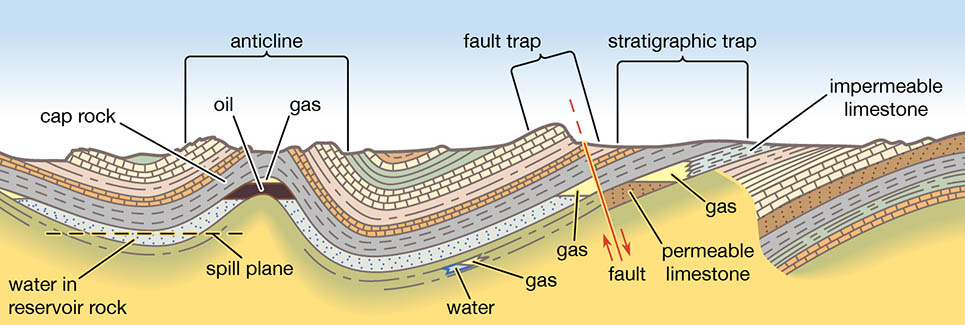
- userLoginStatus

Transport Phenomena in Petroleum Reservoirs
Synthetic program:Key processes that control fluid movement in basin to reservoir scales. Fluid flow in porous and fractured media, saturation profiles. Permeability and relative permeability. Darcy’s Law (phenomenology and theoretical derivation). Anisotropic media and permeability tensor. Scale dependence of hydraulic properties and heterogeneity; theoretical and empirical correlations between flow parameters (specific storage, porosity, permeability). Interpretation of laboratory scale flow experiments on uniform and heterogeneous systems.
Multi-phase flow in porous and fractured media. Multiple phases in equilibrium: Young-Laplace Equation; spreading coefficient; wettability; flow in capillary tubes; contact angle hysteresis. Three- and two-dimensional models for single phase fluid flow in porous media. Initial and boundary conditions. Analytical solutions. Continuous models of fractured systems and discrete fracture networks. Variably saturated flow models. Primary drainage and imbibition. Water content, surface tension, capillary pressure, retention curve, hysteresis. Motion equation: coupling between the phases and Darcy’s Law for variably saturated flows. Effective permeability. Examples of analytical solutions. Displacement processes in mixed-wet media. Basic elements of three-phase flow.
Solute transport processes. Advection Dispersion Equation (ADE) for single dissolved species. Dispersivity tensor. Laboratory and field- scale tracer tests and their interpretation in unconsolidated and fractured systems. Random Walk and continuous time random walk models. Multi-component reactive transport. Models of precipitation-dissolution, sorption and homogeneous reactions in porous media. Interpretation of laboratory experiments. Diagenesis in sedimentary basins.
Data Integration for Petroleum Reservoirs and Inverse Modeling. Introduction and application of techniques aimed at incorporating reservoir scale data (including geological information) and dynamic reservoir behavior into reservoir characterization models; dynamic data in the form of pressure transient tests, tracer tests, multiphase production histories. Well test interpretation techniques in unconsolidated and fractured formations and practical considerations for system characterization. Uncertainty quantification in the characterization of heterogeneous reservoirs: basic principles of geostatistics; probabilistic approaches to flow and transport in heterogeneous reservoirs. General formulation of inverse problems in heterogeneous reservoirs. Model calibration and validation.
Lecture Notes
Complete course:
| Type | File name | Year |
|---|---|---|
| Digital notes | Complete course notes | 2019/2020 |
Divided by topic:
| Type | File name | Year |
|---|---|---|
| File not available... | ||
Other:
| Type | File name | Year |
|---|---|---|
| File not available... | ||
Exercises
Complete course:
| Type | File name | Year |
|---|---|---|
| File not available... | ||
Divided by topic:
| Type | File name | Year |
|---|---|---|
| File not available... | ||
Other:
| Type | File name | Year |
|---|---|---|
| File not available... | ||
Exams
First partial exam:
| Type | Date | |
|---|---|---|
| File not available... | ||
Second partial exam:
| Type | Date | |
|---|---|---|
| File not available... | ||
Full exam:
Oral exam:
| Type | Date | |
|---|---|---|
| File not available... | ||
Multiple choice test:
| Type | Date | |
|---|---|---|
| File not available... | ||
Other:
| File name | ||
|---|---|---|
| File not available... | ||
Other
Laboratory:
| File name | Year | |
|---|---|---|
| File not available... | ||
Projects:
| File name | Year | |
|---|---|---|
| File not available... | ||
Presentations:
| File name | Year | |
|---|---|---|
| File not available... | ||
Collections of notes, exercises or exams:
| File name | Year | |
|---|---|---|
| File not available... | ||
Tables:
| File name | Year | |
|---|---|---|
| File not available... | ||
Etc:
| File name | Year | |
|---|---|---|
| File not available... | ||
Live
Quick daily notes, exercises and audio recordings. Files will be approved on priority but deleted after 365 days. 2 points will be assigned by default.
Quick contents:
| File name | Date | |
|---|---|---|
| File not available... | ||







